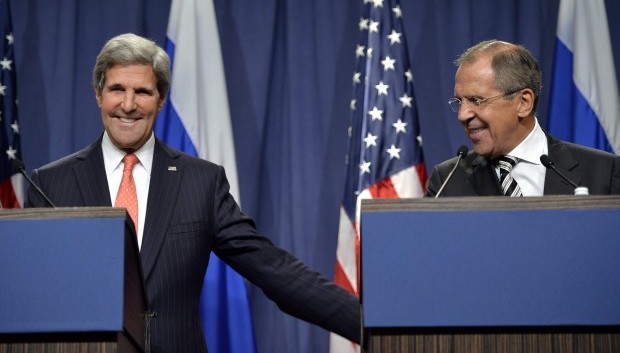
US Secretary of State John Kerry, (L), and Russian Foreign Minister Sergei Lavrov, (R), speak after making statements following meetings regarding Syria, at a news conference at the Geneva, Switzerland, 14 September 2013. (EPA)
Beirut, Asharq Al-Awsat—The Syrian opposition has said it rejects the US–Russian deal to set a framework for the Bashar Al-Assad regime to destroy its chemical arsenal, pledging to continue steps to bring down the regime.
Following three days of intense negotiations, the US and Russia agreed to give the Assad government seven days to provide data about its chemical weapons and allow UN inspectors into the country to supervise, seize and destroy its chemical stockpile.
Speaking to Asharq Al-Awsat, the Syrian National Coalition (SNC) representative in Washington, Najib Al-Ghadban, said: “A meeting will be held soon between the US and SNC officials to explain why we reject the agreement.” He added that the head of the SNC, Ahmad Al-Jarba, is “in a direct contact with US officials.”
Ghadban said that he considered the agreement to be “insufficient to deter the Assad regime from using chemical weapons and killing the Syrian people.” He added that Washington will “understand our rejection . . . and continue to support us on the grounds that there can be no Geneva II without the opposition.”
“The Syrian opposition attaches importance to three points: That the US, France and Britain confirm that Damascus was responsible for the use of chemical weapons, refer the perpetrators to the International Criminal Court, and implement the agreement according to Chapter VII [of the UN Charter],” Ghadban added.
Ghadban’s statements to Asharq Al-Awsat were followed by a similar rejection from Salim Idris, commander of the Free Syrian Army (FSA).
Idriss told reporters: “We do not recognize the Russian initiative and we think the Russians and the Syrian regime are playing games to waste time and to win time for the criminal regime in Damascus.”
“We will facilitate the mission of the investigators in the country but very clearly and frankly there will be no ceasefire with the regime,” Idris said.
Ghadban agreed that “Russia’s intervention to move the issue away from punitive strikes on the Syrian regime did not please us.”
Ghadban expressed fears that Syria’s chemical weapons issue would turn into another version of Iran’s nuclear program in terms of procrastination and time-wasting, adding that the regime agreed to relinquish its chemical arsenal in a like-for-like attempt to secure Assad’s grip on power.
Speaking during a news conference in Turkey, FSA commander Gen. Salim Idris asked: “Are we Syrians supposed to wait until mid-2014, to continue being killed every day and to accept [the deal] just because the chemical arms will be destroyed in 2014?”
“We respect our friends [in the international community], and we hope our friends understand our position. . . . We cannot accept this initiative because it ignores the massacre of our people,” he added.
“We have told our friends that the regime has begun moving part of its chemical weapons arsenal to Lebanon and Iraq. We told them do not be fooled,” Idris told reporters.
